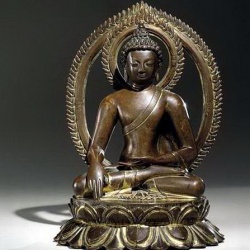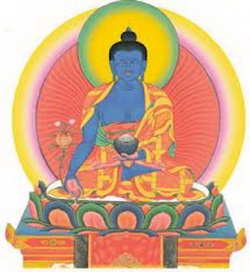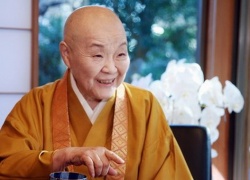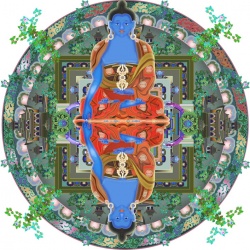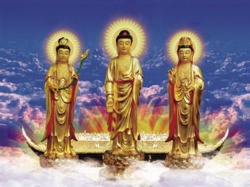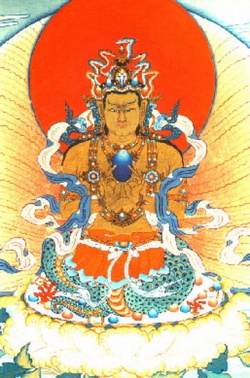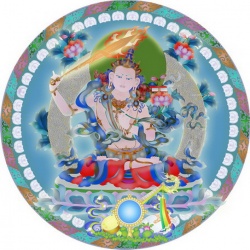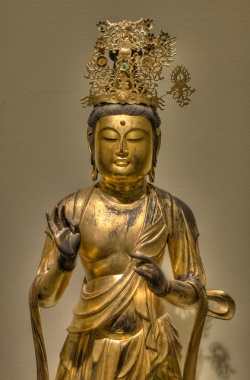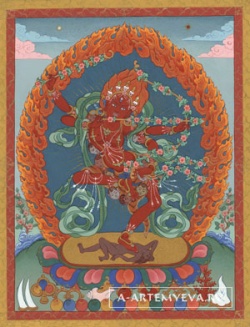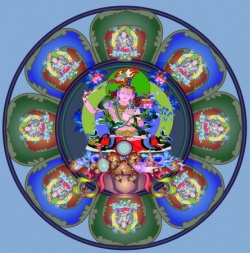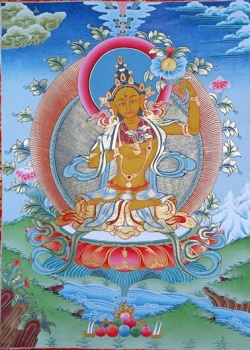Difference between revisions of "Buddhism is about Deconstruction"
m (Text replacement - "[[[" to "([[") |
m (Text replacement - "]]]" to "]])") |
||
| Line 157: | Line 157: | ||
Without having enjoyed | Without having enjoyed | ||
| − | ([[sensual pleasures]] | + | ([[sensual pleasures]]), |
you go for [[alms]], [[monk]]. | you go for [[alms]], [[monk]]. | ||
You don’t go for [[alms]] | You don’t go for [[alms]] | ||
| Line 190: | Line 190: | ||
“[[Monk]], it’s not easy for us to go to the [[Blessed One]], as he is surrounded by other [[devas]] of great influence. But if you go to the [[Blessed One]] and ask him this {{Wiki|matter}}, I will come along to hear the [[Dhamma]].” | “[[Monk]], it’s not easy for us to go to the [[Blessed One]], as he is surrounded by other [[devas]] of great influence. But if you go to the [[Blessed One]] and ask him this {{Wiki|matter}}, I will come along to hear the [[Dhamma]].” | ||
| − | Responding to the [[devata]], “As you say, my [[friend]],” Ven. [[Samiddhi]] went to the [[Blessed One]]. On arrival, he [[bowed]] down to the [[Blessed One]] and sat to one side. As he was sitting there [he told the [[Blessed One]] his entire [[conversation]] with the [[devata]] | + | Responding to the [[devata]], “As you say, my [[friend]],” Ven. [[Samiddhi]] went to the [[Blessed One]]. On arrival, he [[bowed]] down to the [[Blessed One]] and sat to one side. As he was sitting there [he told the [[Blessed One]] his entire [[conversation]] with the [[devata]]). “Now, [[lord]], if that [[devata]] was telling the [[truth]], she is not far from here.” |
When this was said, the [[devata]] said to Ven. [[Samiddhi]], “Ask, [[monk]]! Ask! I’ve gotten through.” | When this was said, the [[devata]] said to Ven. [[Samiddhi]], “Ask, [[monk]]! Ask! I’ve gotten through.” | ||
| Line 273: | Line 273: | ||
to the goal.” | to the goal.” | ||
| − | The [[Pāḷi]] is [[animitto]] [[samādhi]]. There are three [[samādhis]] mentioned in the [[Saṅgīti Sutta]] and a few other [[suttas]]: [[emptiness]] [[samādhi]] ([[suññatā samādhi]]), [[signless samādhi]] ([[animittā samādhi]]), and undirected [[samādhi]] [([[appaṇihitā samādhi]] | + | The [[Pāḷi]] is [[animitto]] [[samādhi]]. There are three [[samādhis]] mentioned in the [[Saṅgīti Sutta]] and a few other [[suttas]]: [[emptiness]] [[samādhi]] ([[suññatā samādhi]]), [[signless samādhi]] ([[animittā samādhi]]), and undirected [[samādhi]] [([[appaṇihitā samādhi]])]). The {{Wiki|status}} and place of these [[samādhis]] isn't clearly spelled out in the [[suttas]], but it's clear that they are fruitional [[meditations]] and not to be equated with any of the four [[formless]] [[attainments]] or the [[attainment]] of the [[cessation]] of {{Wiki|apperception}} and [[feeling]]. |
In addition to the [[suttas]] already posted, MN 43 [[Mahāvedalla Sutta]] describes the [[signless]] [[liberation of mind]] ([[animittā cetovimutti]]) as follows: | In addition to the [[suttas]] already posted, MN 43 [[Mahāvedalla Sutta]] describes the [[signless]] [[liberation of mind]] ([[animittā cetovimutti]]) as follows: | ||
| Line 315: | Line 315: | ||
'The [[perception]] of [[inconstancy]], when developed & pursued, is of great fruit, of great [[benefit]]. It gains a footing in the {{Wiki|Deathless}}, has the {{Wiki|Deathless}} as its final end': Thus was it said. In reference to what was it said? | 'The [[perception]] of [[inconstancy]], when developed & pursued, is of great fruit, of great [[benefit]]. It gains a footing in the {{Wiki|Deathless}}, has the {{Wiki|Deathless}} as its final end': Thus was it said. In reference to what was it said? | ||
| − | When a [[monk's]] [[awareness]] often remains steeped in the [[perception]] of [[inconstancy]], his [[mind]] shrinks away from gains, [[offerings]], & [[fame]], bends away, pulls back, and is not drawn in, and either [[equanimity]] or loathing take a stance. Just as a cock's feather or a piece of tendon, when thrown into a [[fire]], shrinks away, bends away, pulls back, and is not drawn in; in the same way, when a [[monk's]] [[awareness]] often remains steeped in the [[perception]] of [[inconstancy]], his [[mind]] shrinks away from gains, [[offerings]], & [[fame]], bends away, pulls back, and is not drawn in, and either [[equanimity]] or loathing take a stance. If, when a [[monk's]] [[awareness]] often remains steeped in the [[perception]] of [[inconstancy]], his [[mind]] inclines to gains, [[offerings]], & [[fame]], or if non-loathing takes a stance, then he should realize, 'I have not developed the [[perception]] of [[inconstancy]]; there is no step-by-step {{Wiki|distinction}} in me; I have not arrived at the fruit of ([[mental]] | + | When a [[monk's]] [[awareness]] often remains steeped in the [[perception]] of [[inconstancy]], his [[mind]] shrinks away from gains, [[offerings]], & [[fame]], bends away, pulls back, and is not drawn in, and either [[equanimity]] or loathing take a stance. Just as a cock's feather or a piece of tendon, when thrown into a [[fire]], shrinks away, bends away, pulls back, and is not drawn in; in the same way, when a [[monk's]] [[awareness]] often remains steeped in the [[perception]] of [[inconstancy]], his [[mind]] shrinks away from gains, [[offerings]], & [[fame]], bends away, pulls back, and is not drawn in, and either [[equanimity]] or loathing take a stance. If, when a [[monk's]] [[awareness]] often remains steeped in the [[perception]] of [[inconstancy]], his [[mind]] inclines to gains, [[offerings]], & [[fame]], or if non-loathing takes a stance, then he should realize, 'I have not developed the [[perception]] of [[inconstancy]]; there is no step-by-step {{Wiki|distinction}} in me; I have not arrived at the fruit of ([[mental]]) [[development]].' In that way he is alert there. But if, when a [[monk's]] [[awareness]] often remains steeped in the [[perception]] of [[inconstancy]], his [[mind]] shrinks away from gains, [[offerings]], & [[fame]], bends away, pulls back, and is not drawn in, and either [[equanimity]] or loathing take a stance, then he should realize, 'I have developed the [[perception]] of [[inconstancy]]; there is a step-by-step {{Wiki|distinction}} in me; I have arrived at the fruit of ([[mental]]) [[development]].' In that way he is alert there. |
'The [[perception]] of [[inconstancy]], when developed & pursued, is of great fruit, of great [[benefit]]. It gains a footing in the {{Wiki|Deathless}}, has the {{Wiki|Deathless}} as its final end': Thus was it said, and in reference to this was it said. | 'The [[perception]] of [[inconstancy]], when developed & pursued, is of great fruit, of great [[benefit]]. It gains a footing in the {{Wiki|Deathless}}, has the {{Wiki|Deathless}} as its final end': Thus was it said, and in reference to this was it said. | ||
| Line 321: | Line 321: | ||
'The [[perception]] of [[stress]] in what is inconstant, when developed & pursued, is of great fruit, of great [[benefit]]. It gains a footing in the {{Wiki|Deathless}}, has the {{Wiki|Deathless}} as its final end': Thus was it said. In reference to what was it said? | 'The [[perception]] of [[stress]] in what is inconstant, when developed & pursued, is of great fruit, of great [[benefit]]. It gains a footing in the {{Wiki|Deathless}}, has the {{Wiki|Deathless}} as its final end': Thus was it said. In reference to what was it said? | ||
| − | When a [[monk's]] [[awareness]] often remains steeped in the [[perception]] of [[stress]] in what is inconstant, a fierce [[perception]] of [[danger]] & [[fear]] is established in him toward idleness, indolence, [[laziness]], heedlessness, lack of commitment, & lack of {{Wiki|reflection}}, as if toward a murderer with an upraised sword. If, when a [[monk's]] [[awareness]] often remains steeped in the [[perception]] of [[stress]] in what is inconstant, a fierce [[perception]] of [[danger]] & [[fear]] is not established in him toward idleness, indolence, [[laziness]], heedlessness, lack of commitment, & lack of {{Wiki|reflection}}, as if toward a murderer with an upraised sword, then he should realize, 'I have not developed the [[perception]] of [[stress]] in what is inconstant; there is no step-by-step {{Wiki|distinction}} in me; I have not arrived at the fruit of ([[mental]] | + | When a [[monk's]] [[awareness]] often remains steeped in the [[perception]] of [[stress]] in what is inconstant, a fierce [[perception]] of [[danger]] & [[fear]] is established in him toward idleness, indolence, [[laziness]], heedlessness, lack of commitment, & lack of {{Wiki|reflection}}, as if toward a murderer with an upraised sword. If, when a [[monk's]] [[awareness]] often remains steeped in the [[perception]] of [[stress]] in what is inconstant, a fierce [[perception]] of [[danger]] & [[fear]] is not established in him toward idleness, indolence, [[laziness]], heedlessness, lack of commitment, & lack of {{Wiki|reflection}}, as if toward a murderer with an upraised sword, then he should realize, 'I have not developed the [[perception]] of [[stress]] in what is inconstant; there is no step-by-step {{Wiki|distinction}} in me; I have not arrived at the fruit of ([[mental]]) [[development]].' In that way he is alert there. But if, when a [[monk's]] [[awareness]] often remains steeped in the [[perception]] of [[stress]] in what is inconstant, a fierce [[perception]] of [[danger]] & [[fear]] is established in him toward idleness, indolence, [[laziness]], heedlessness, lack of commitment, & lack of {{Wiki|reflection}}, as if toward a murderer with an upraised sword, then he should realize, 'I have developed the [[perception]] of [[stress]] in what is inconstant; there is a step-by-step {{Wiki|distinction}} in me; I have arrived at the fruit of ([[mental]]) [[development]].' In that way he is alert there. |
'The [[perception]] of [[stress]] in what is inconstant, when developed & pursued, is of great fruit, of great [[benefit]]. It gains a footing in the {{Wiki|Deathless}}, has the {{Wiki|Deathless}} as its final end': Thus was it said, and in reference to this was it said. | 'The [[perception]] of [[stress]] in what is inconstant, when developed & pursued, is of great fruit, of great [[benefit]]. It gains a footing in the {{Wiki|Deathless}}, has the {{Wiki|Deathless}} as its final end': Thus was it said, and in reference to this was it said. | ||
| Line 327: | Line 327: | ||
'The [[perception]] of [[not-self]] in what is stressful, when developed & pursued, is of great fruit, of great [[benefit]]. It gains a footing in the {{Wiki|Deathless}}, has the {{Wiki|Deathless}} as its final end': Thus was it said. In reference to what was it said? | 'The [[perception]] of [[not-self]] in what is stressful, when developed & pursued, is of great fruit, of great [[benefit]]. It gains a footing in the {{Wiki|Deathless}}, has the {{Wiki|Deathless}} as its final end': Thus was it said. In reference to what was it said? | ||
| − | When a [[monk's]] [[awareness]] often remains steeped in the [[perception]] of [[not-self]] in what is stressful, his [[heart]] is devoid of I-making & my-making with regard to this [[conscious]] [[body]] and externally with regard to all themes, has transcended [[pride]], is at [[peace]], and is well-released. If, when a [[monk's]] [[awareness]] often remains steeped in the [[perception]] of [[not-self]] in what is stressful, his [[heart]] is not devoid of I-making & my-making with regard to this [[conscious]] [[body]] and externally with regard to all themes, has not transcended [[pride]], is not at [[peace]], and is not well-released, then he should realize, 'I have not developed the [[perception]] of [[not-self]] in what is stressful; there is no step-by-step {{Wiki|distinction}} in me; I have not arrived at the fruit of ([[mental]] | + | When a [[monk's]] [[awareness]] often remains steeped in the [[perception]] of [[not-self]] in what is stressful, his [[heart]] is devoid of I-making & my-making with regard to this [[conscious]] [[body]] and externally with regard to all themes, has transcended [[pride]], is at [[peace]], and is well-released. If, when a [[monk's]] [[awareness]] often remains steeped in the [[perception]] of [[not-self]] in what is stressful, his [[heart]] is not devoid of I-making & my-making with regard to this [[conscious]] [[body]] and externally with regard to all themes, has not transcended [[pride]], is not at [[peace]], and is not well-released, then he should realize, 'I have not developed the [[perception]] of [[not-self]] in what is stressful; there is no step-by-step {{Wiki|distinction}} in me; I have not arrived at the fruit of ([[mental]]) [[development]].' In that way he is alert there. But if, when a [[monk's]] [[awareness]] often remains steeped in the [[perception]] of [[not-self]] in what is stressful, his [[heart]] is devoid of I-making & my-making with regard to this [[conscious]] [[body]] and externally with regard to all themes, has transcended [[pride]], is at [[peace]], and is well-released, then he should realize, 'I have developed the [[perception]] of [[not-self]] in what is stressful; there is a step-by-step {{Wiki|distinction}} in me; I have arrived at the fruit of ([[mental]]) [[development]].' In that way he is alert there. |
'The [[perception]] of [[not-self]] in what is stressful, when developed & pursued, is of great fruit, of great [[benefit]]. It gains a footing in the {{Wiki|Deathless}}, has the {{Wiki|Deathless}} as its final end': Thus was it said, and in reference to this was it said. | 'The [[perception]] of [[not-self]] in what is stressful, when developed & pursued, is of great fruit, of great [[benefit]]. It gains a footing in the {{Wiki|Deathless}}, has the {{Wiki|Deathless}} as its final end': Thus was it said, and in reference to this was it said. | ||
Latest revision as of 03:10, 4 April 2016
Hopefully Thusness and Simpo would comment too. In summary: Buddhism is about the deconstruction of perception through insight, so that proliferation (conceptualizing, perceiving constructs, and craving) can end.
I was contemplating on whether sense of self still arise nowadays and notice that despite nonduality and anatta (I no longer conceive a dualistic agent or perceiver), sometimes there is the bodily sensation of tension (even though it appears that the mind is very calm but strangely these bodily sensations arise under especially challenging circumstances - even though it is not often). It is an entirely impersonal process, that occurs via latent tendencies, via dependent origination. It is like a sense of tension, even if there is no mental commentary. It doesn't stick, but it can still arise. There is also still habitual seeking after pleasant experiences, even if it is apparently harmless stuff like music. I think all these are sense of self. Sense of self arise whenever there is a perception, sign, or construct of something inherent. ANY construct... is a construct of self, of some 'thing'. The sense of self lives in constructs of I, me, mine, and objects.
I think Buddha here below is saying any form of craving at all = sense of self. Yes, if there is no sense of posessiveness, (I, me, mine) how can there be at all any craving or fear or affliction? It is quite subtle but also apparent.
The commentator says “This second approach is the one recommended in this discourse: when the Buddha talks of "smashing, scattering, & demolishing form (etc.) and making it unfit for play," he is referring to the practice of analyzing form minutely into its component parts until it no longer seems a fit object for passion & delight. When all five aggregates can be treated in this way, the mind is left with no conditioned object to serve as a focal point for its passion, and so is released — at the very least — to the stage of Awakening called non-return.“
In other words, no craving can arise without a craving after a sign, and a sign means a perception or construct of something pleasant. If there is no signs at all due to full deconstruction, there cannot be an object of craving! Thereby ending attraction, clinging to, to sense pleasures, to forms, to the formless, or to the opposite sex (or same sex for some), or any kind of sexual craving.
Those who still likes good food, sex, rest, money, women, etc etc, I do not consider him as having overcome craving. There are those like Actualist Richard who likes sex and smoking and yet claim to have no craving. I do not consider him as being honest. Frankly it is bullshit to me. To be honest, at a certain phase of my practice I too thought I have overcome such 'emotions' but upon much reflection I think what I wrote is bullshit (ok, maybe not entirely bullshit but somewhat exaggerated) so I edited my preface 2. I don't really lust after girls nowadays unlike in the past (or guys for that matter just in case you think I'm gay haha) and I have serious doubts I am going to get married (but shall see, lol, I definitely prefer liberation over marriage ;) ), but I still listen to music, eat my snacks, and occasionally even go for parties and dance (if my friends invites me that is). I don't notice much 'craving' but how can I deny that there is this tendency and subtle almost subconscious and habitual urge which drives this process of going after what is sensually pleasant! In other words, even though strong passions no longer arise, there is still a subtle preference for the pleasant over the unpleasant. Yes it appears even in my experience that such passions can be dwindled to a large degree and is replaced by an effortless ongoing flow of pure and naked apperceptive awareness without a 'self' (like even right now, there is simply the intimate and pure sensate clarity/experience of hearing/sound, seeing/sight, typing, no sense of self/Self whatsoever), so I do not doubt that there is certainly a significant change after anatta which does sometimes give the mistaken impression that one has 'overcome' - but I do not believe there can be actions of seeking after sensual pleasures if there is no craving fuelling them, however subtle they may be compared to before. Afterall the Buddha made clear that Arahants who overcome craving cannot possibly have sex. Why? Because sexual acts require sexual and sensual arousal which requires the perception and sign of pleasantness and its craving for sustenance.
By the way readers, I do not imply that Buddhism is only those who give up sex and sensual pleasures. You can still progress quite far without giving up lay life and sensual enjoyments of such nature. The Buddha in the suttas made it very clear that hundreds and thousands of his lay students continue to enjoy sensual pleasures while in the stream-entry and once-returner level of awakening (also, despite realization of twofold emptiness, afflictions like craving are only lessened in 2nd bhumi and totally removed in 8th bhumi in the Mahayana Bodhisattva scheme). It is just that when you transit to non-returner, you will naturally give up such pleasures because there is no more craving after them. My point is just this: do not think that you have reach there if you still have any form of craving after sensual experience!!!
So back to topic - everything in buddhism is about deconstruction. Even the contemplation of the impurity of the body is to deconstruct the body into its impure constituents through insight so that there is no longer this solid image of something pleasant to crave after!
It is like a person with an eye disease, that when looking from afar appears to see a paradise - but when walking nearer to the object discovers that there is no paradise over there - it is a mere illusion! Similarly, all signs of attractiveness are due to poor-sight, poor vision, of the way things are.
Someone with little insight looks at a girl and grows infatuated, dwells into the sign of attractiveness of the body. But one with insight is like the person with eye-disease walking closer to the object. It is to discern and contemplate what exactly is the 'body' that he/she is attracted to? Is it really a solid entity? Is it something really attractive? With clear discernment, one discovers that the body is empty of any substantial entity that is attractive - it is just a convention for a conglomerate of impure parts - ‘In this body there are head-hairs, body-hairs, nails, teeth, skin, flesh, sinews, bones, bone-marrow, kidneys, heart, liver, diaphragm, spleen, lungs, intestines, mesentery, contents of the stomach, feces, bile, phlegm, pus, blood, sweat, fat, tears, grease, spittle, snot, oil of the joints, and urine.’
Please do not misunderstand that the Buddha is being pessimistic - the Buddha simply wanted us to take a closer look at our object of attraction to discern what exactly is it that we are attracted to! He wasn't a pessimist, he was simply being realistic, he wants us to see the nature of reality. And to our surprise, the object of our craving is really NOTHING AT ALL like what we had in mind...
And what about things like music? Even the desire for music depends on the idea that there is 'something' there for you to cling to, to crave for. But there is absolutely nothing at all - in impermanent, insubstantial, dependently originated and empty sensations and sounds that can be an object of clinging! There is absolutely nothing that is I, me, mine, or having substantial existence that could be an object of clinging. Nothing is permanent, nothing pertains to self, nothing is not suffering, and nothing is not empty.
Next time you have a strong craving for something - for example, a girl, then ask yourself, what is it about the girl I like? Her voice? Her voice is also a name for many audible tones, which are impermanent, dependently originated, empty. Her body? But body is also a name, what is it do you like? The skin? The skin is just a scaly 'thing' covering the body. How is it attractive? The eyes? If I gourge out the eyes, is it attractive? Etc etc...
Or if you have strong craving for ice cream, what about ice cream do I like? The taste? The taste too is more flickering, empty, dependently originated sensations... ungraspable.
A song? What about the song do I like? The drum beat? The 'ting' sound? The notion of a 'pleasant song' too is an empty construct! We link up the notes into one substantial 'pleasant sign' which we crave after...
So deconstruction leads to the end of craving by exposing the self and objects of clinging as what they are - phantasms. There is just the audible-emptiness, tactile-emptiness, visual-emptiness, etc - emptiness and form inseparable. Luminosity and emptiness inseparable. Self-liberating!
There is no self, no music, no body, no ice cream, no life, no death...!
Don't talk about self-liberation before going through this thorough deconstruction. Engaging in craving, mistaking proliferation for awakened mind is the greatest disease - the most pathetic mistake!
SN 23.2
PTS: S iii 189
CDB i 985
Satta Sutta: A Being
translated from the Pali by
Thanissaro Bhikkhu
© 1999–2012
Translator's note: A number of discourses (among them, SN 35.191; AN 6.63) make the point that the mind is fettered, not by things like the five aggregates or the objects of the six senses, but by the act of passion & delight for them. There are two ways to try to cut through this fetter. One is to focus on the drawbacks of passion & delight in & of themselves, seeing clearly the stress & suffering they engender in the mind. The other is to analyze the objects of passion & delight in such a way that they no longer seem worthy of interest. This second approach is the one recommended in this discourse: when the Buddha talks of "smashing, scattering, & demolishing form (etc.) and making it unfit for play," he is referring to the practice of analyzing form minutely into its component parts until it no longer seems a fit object for passion & delight. When all five aggregates can be treated in this way, the mind is left with no conditioned object to serve as a focal point for its passion, and so is released — at the very least — to the stage of Awakening called non-return.
I have heard that on one occasion the Blessed One was staying near Savatthi at Jeta's Grove, Anathapindika's monastery. Then Ven. Radha went to the Blessed One and, on arrival, having bowed down to him sat to one side. As he was sitting there he said to the Blessed One: "'A being,' lord. 'A being,' it's said. To what extent is one said to be 'a being'?"
"Any desire, passion, delight, or craving for form, Radha: when one is caught up[1] there, tied up[2] there, one is said to be 'a being.'[3]
"Any desire, passion, delight, or craving for feeling... perception... fabrications...
"Any desire, passion, delight, or craving for consciousness, Radha: when one is caught up there, tied up there, one is said to be 'a being.'
"Just as when boys or girls are playing with little sand castles:[4] as long as they are not free from passion, desire, love, thirst, fever, & craving for those little sand castles, that's how long they have fun with those sand castles, enjoy them, treasure them, feel possessive of them. But when they become free from passion, desire, love, thirst, fever, & craving for those little sand castles, then they smash them, scatter them, demolish them with their hands or feet and make them unfit for play.
"In the same way, Radha, you too should smash, scatter, & demolish form, and make it unfit for play. Practice for the ending of craving for form.
"You should smash, scatter, & demolish feeling, and make it unfit for play. Practice for the ending of craving for feeling.
"You should smash, scatter, & demolish perception, and make it unfit for play. Practice for the ending of craving for perception.
"You should smash, scatter, & demolish fabrications, and make them unfit for play. Practice for the ending of craving for fabrications.
"You should smash, scatter, & demolish consciousness and make it unfit for play. Practice for the ending of craving for consciousness — for the ending of craving, Radha, is Unbinding."
Notes
1.
Satta.
2.
Visatta.
3.
Satta.
4.
Lit.: "dirt houses."
Phena Sutta:
"Now suppose that a magician or magician's apprentice were to display a magic trick at a major intersection, and a man with good eyesight were to see it, observe it, & appropriately examine it. To him — seeing it, observing it, & appropriately examining it — it would appear empty, void, without substance: for what substance would there be in a magic trick? In the same way, a monk sees, observes, & appropriately examines any consciousness that is past, future, or present; internal or external; blatant or subtle; common or sublime; far or near. To him — seeing it, observing it, & appropriately examining it — it would appear empty, void, without substance: for what substance would there be in consciousness?
"Seeing thus, the well-instructed disciple of the noble ones grows disenchanted with form, disenchanted with feeling, disenchanted with perception, disenchanted with fabrications, disenchanted with consciousness. Disenchanted, he grows dispassionate. Through dispassion, he's released. With release there's the knowledge, 'Released.' He discerns that 'Birth is ended, the holy life fulfilled, the task done. There is nothing further for this world.'"
Edited by An Eternal Now 22 Apr `12, 12:55AM
20 Apr `12, 11:39PM
SN 35.95
PTS: S iv 72
CDB ii 1175
Malunkyaputta Sutta: To Malunkyaputta
translated from the Pali by
Thanissaro Bhikkhu
© 2005–2012
Alternate translation: Walshe
Then Ven. Malunkyaputta, who was ardent & resolute, went to the Blessed One and, on arrival, having bowed down to him, sat to one side. As he was sitting there, he said to the Blessed One: "It would be good, lord, if the Blessed One would teach me the Dhamma in brief so that, having heard the Dhamma from the Blessed One, I might dwell alone in seclusion: heedful, ardent, & resolute."
"Here now, Malunkyaputta: What will I say to the young monks when you — aged, old, elderly, along in years, come to the last stage of life — ask for an admonition in brief?"
"Lord, even though I'm aged, old, elderly, along in years, come to the last stage of life, may the Blessed One teach me the Dhamma in brief! May the One Well-gone teach me the Dhamma in brief! It may well be that I'll understand the Blessed One's words. It may well be that I'll become an heir to the Blessed One's words."
"What do you think, Malunkyaputta: the forms cognizable via the eye that are unseen by you — that you have never before seen, that you don't see, and that are not to be seen by you: Do you have any desire or passion or love there?"
"No, lord."[1]
"The sounds cognizable via the ear...
"The aromas cognizable via the nose...
"The flavors cognizable via the tongue...
"The tactile sensations cognizable via the body...
"The ideas cognizable via the intellect that are uncognized by you — that you have never before cognized, that you don't cognize, and that are not to be cognized by you: Do you have any desire or passion or love there?"
"No, lord."
"Then, Malunkyaputta, with regard to phenomena to be seen, heard, sensed, or cognized: In reference to the seen, there will be only the seen. In reference to the heard, only the heard. In reference to the sensed, only the sensed. In reference to the cognized, only the cognized. That is how you should train yourself. When for you there will be only the seen in reference to the seen, only the heard in reference to the heard, only the sensed in reference to the sensed, only the cognized in reference to the cognized, then, Malunkyaputta, there is no you in connection with that. When there is no you in connection with that, there is no you there. When there is no you there, you are neither here nor yonder nor between the two. This, just this, is the end of stress."[2]
"I understand in detail, lord, the meaning of what the Blessed One has said in brief:
Seeing a form — mindfulness lapsed — attending to the theme of 'endearing,' impassioned in mind, one feels and remains fastened there. One's feelings, born of the form, grow numerous, Greed & annoyance injure one's mind. Thus amassing stress, one is said to be far from Unbinding. Hearing a sound... Smelling an aroma... Tasting a flavor... Touching a tactile sensation... Knowing an idea — mindfulness lapsed — attending to the theme of 'endearing,' impassioned in mind, one feels and remains fastened there. One's feelings, born of the idea, grow numerous, Greed & annoyance injure one's mind. Thus amassing stress, one is said to be far from Unbinding. Not impassioned with forms — seeing a form with mindfulness firm — dispassioned in mind, one knows and doesn't remain fastened there. While one is seeing a form — and even experiencing feeling — it falls away and doesn't accumulate. Thus one fares mindfully. Thus not amassing stress, one is said to be in the presence of Unbinding. Not impassioned with sounds... Not impassioned with aromas... Not impassioned with flavors... Not impassioned with tactile sensations... Not impassioned with ideas — knowing an idea with mindfulness firm — dispassioned in mind, one knows and doesn't remain fastened there. While one is knowing an idea — and even experiencing feeling — it falls away and doesn't accumulate. Thus one fares mindfully. Thus not amassing stress, one is said to be in the presence of Unbinding.
"It's in this way, lord, that I understand in detail the meaning of what the Blessed One said in brief."
"Good, Malunkyaputta. Very good. It's good that you understand in detail this way the meaning of what I said in brief."
[The Buddha then repeats the verses.]
"It's in this way, Malunkyaputta, that the meaning of what I said in brief should be regarded in detail."
Then Ven. Malunkyaputta, having been admonished by the admonishment from the Blessed One, got up from his seat and bowed down to the Blessed One, circled around him, keeping the Blessed One to his right side, and left. Then, dwelling alone, secluded, heedful, ardent, & resolute, he in no long time reached & remained in the supreme goal of the holy life for which clansmen rightly go forth from home into homelessness, knowing & realizing it for himself in the here & now. He knew: "Birth is ended, the holy life fulfilled, the task done. There is nothing further for the sake of this world." And thus Ven. Malunkyaputta became another one of the arahants.
Notes
1.
It is possible, of course, to have desire for a sight that one has not seen. Strictly speaking, however, the desire is not "there" at the unseen sight. Rather, it's there at the present idea of the unseen sight. This distinction is important for the purpose of the practice.
2.
See Ud 1.10, where the Buddha gives these same instructions to Bahiya of the Bark-cloth.
21 Apr `12, 12:10AM
Buddha taught that there are three doors to liberation:
Emptiness, Signlessness, and Aimlessness.
Looking at the potato chips - immediately the mind by latent tendencies arise the thought - potato chips is tasty! And if the mind loses its mindfulness, the hand immediately goes out and grabs the potato chips unconsciously.
If there is mindfulness, the thought of potato chips arises and ceases instantaneously - there is no following after any sign at all. Just an empty thought! There is no potato chips! Never has, never was, never will be.
Edited by An Eternal Now 21 Apr `12, 12:50AM
24 Apr `12, 9:51PM
Buddha, MN22: “Bhikkhus, that one can engage in sensual pleasures without sensual desires, without perceptions of sensual desire, without thoughts of sensual desire – that is impossible.”
Buddha said what I was saying here but the deva didn’t understand:
I have heard that on one occasion the Blessed One was staying near Rajagaha at Tapoda monastery. Then Ven. Samiddhi, as night was ending, got up & went to the Tapoda Hot Springs to bathe his limbs. Having bathed his limbs and gotten out of the springs, he stood wearing only his lower robe, letting his limbs dry.
Then a certain devata, in the far extreme of the night, her extreme radiance lighting up the entire Tapoda Hot Springs, approached Ven. Samiddhi. On arrival, while standing in the air, she addressed him with this verse:
Without having enjoyed
(sensual pleasures),
you go for alms, monk.
You don’t go for alms
after having enjoyed.
Having enjoyed, monk,
then go for alms.
Don’t let time pass you by.
/>I don't know my time.
My time
is hidden.
It can't be seen.
That's why, not having enjoyed,
I go for alms:
Don't let my time pass me by.
Then the devata, coming down to earth, said to Ven. Samiddhi, "You have gone forth while young, monk — black-haired, endowed with the blessings of youth in the first stage of life — without having played with sensual pleasures. Enjoy human sensuality, monk. Don't drop what is visible here-&-now in pursuit of what's subject to time."
“My friend, I’m not dropping what’s visible here-&-now in pursuit of what’s subject to time. I’m dropping what’s subject to time in pursuit of what’s visible here-&-now. For the Blessed One has said that sensual pleasures are subject to time, of much stress, much despair, & greater drawbacks; whereas this Dhamma is visible here-&-now, not subject to time, inviting all to come & see, pertinent, to be known by the wise for themselves.”
“But, monk, in what way has the Blessed One said that sensual pleasures are subject to time, of much stress, much despair, & greater drawbacks? And how is this Dhamma visible here-&-now, not subject to time, inviting all to come & see, pertinent, to be known by the wise for themselves?”
“I’m new, my friend, not long gone forth, only recently come to this Dhamma & discipline. I can’t explain it in detail. But the Blessed One, worthy & rightly self-awakened, is staying here in Rajagaha at Tapoda monastery. Having gone to him, ask him this matter. As he explains it, that’s how you should remember it.”
“Monk, it’s not easy for us to go to the Blessed One, as he is surrounded by other devas of great influence. But if you go to the Blessed One and ask him this matter, I will come along to hear the Dhamma.”
Responding to the devata, “As you say, my friend,” Ven. Samiddhi went to the Blessed One. On arrival, he bowed down to the Blessed One and sat to one side. As he was sitting there [he told the Blessed One his entire conversation with the devata). “Now, lord, if that devata was telling the truth, she is not far from here.”
When this was said, the devata said to Ven. Samiddhi, “Ask, monk! Ask! I’ve gotten through.”
Then the Blessed One recited this verse to the devata:
Perceiving in terms of signs, beings
take a stand on signs.
Not fully comprehending signs, they
come into the bonds
of death.
But fully comprehending signs, one
doesn’t construe
a signifier.
Yet nothing exists for him
by which one would say,
‘To him no thought occurs.’
If you know this, spirit, then say so.
“I don’t understand, lord, the detailed meaning of the Blessed One’s brief statement. It would be good if the Blessed One would speak in such a way that I would understand the detailed meaning of the Blessed One’s brief statement.”
[The Blessed One said:]
Whoever construes
‘equal,’
‘superior,’ or
‘inferior,’
by that he’d dispute.
Whereas to one unaffected by these three,
‘equal’
‘superior’
do not occur.
If you know this, spirit, then say so.
“I don’t understand, lord, the detailed meaning of the Blessed One’s brief statement. It would be good if the Blessed One would speak in such a way that I would understand the detailed meaning of the Blessed One’s brief statement.”
/>Having shed classifications,
gone beyond conceit,
he has here
cut
through craving
for name
& form:
This one —
his bonds cut through,
free from trouble,
from longing —
though they search they can't find him,
human & heavenly beings,
here & beyond,
in heaven
or any abode.
If you know this, spirit, then say so.
“Lord, here’s how I understand the detailed meaning of the Blessed One’s brief statement:
In all the world,
every world,
you should do no evil
with speech,
body,
or mind.
Having abandoned sensual pleasures
— mindful, alert —
don’t consort with suffering & stress,
with what doesn’t pertain
to the goal.”
The Pāḷi is animitto samādhi. There are three samādhis mentioned in the Saṅgīti Sutta and a few other suttas: emptiness samādhi (suññatā samādhi), signless samādhi (animittā samādhi), and undirected samādhi [(appaṇihitā samādhi)]). The status and place of these samādhis isn't clearly spelled out in the suttas, but it's clear that they are fruitional meditations and not to be equated with any of the four formless attainments or the attainment of the cessation of apperception and feeling.
In addition to the suttas already posted, MN 43 Mahāvedalla Sutta describes the signless liberation of mind (animittā cetovimutti) as follows:
What is the signless liberation of mind? There is the case where a monk, through not attending to all signs, enters and remains in the signless concentration of mind. Friend, this is said to be the signless liberation of mind.
MN 43 Mahāvedalla Sutta describes the emptiness liberation of mind (suññatā cetovimutti) as follows:
What is the emptiness liberation of mind? Here a monk goes to the forest, to the root of a tree, or to an empty place and reflects: 'This is empty of a self or that which belongs to a self.' Friend, this is said to be the emptiness liberation of mind.
The development of undirected samādhi (appaṇihitā samādhi) is described in SN 47.10 Bhikkhunūpassaya Sutta:
And how, Ānanda, is there development without direction (appaṇidhāya bhāvanā)?
Not directing his mind outwardly, a monk understands: 'My mind is not directed outwardly.' Then he understands: 'It is unconstricted after and before, liberated, undirected.' Then he further understands: 'I dwell contemplating the body in the body, ardent, fully aware, mindful; I am [experiencing] pleasure.'
Not directing his mind outwardly, a monk understands: 'My mind is not directed outwardly.' Then he understands: 'It is unconstricted after and before, liberated, undirected.' Then he further understands: 'I dwell contemplating feelings in feelings, ardent, fully aware, mindful; I am [experiencing] pleasure.'
Not directing his mind outwardly, a monk understands: 'My mind is not directed outwardly.' Then he understands: 'It is unconstricted after and before, liberated, undirected.' Then he further understands: 'I dwell contemplating mind in mind, ardent, fully aware, mindful; I am [experiencing] pleasure.'
Not directing his mind outwardly, a monk understands: 'My mind is not directed outwardly.' Then he understands: 'It is unconstricted after and before, liberated, undirected.' Then he further understands: 'I dwell contemplating phenomena in phenomena, ardent, fully aware, mindful; I am [experiencing] pleasure.'
It is in this way, Ānanda, that there is development without direction.
In the Abhidhammapiṭaka Dhammasaṅgaṇī these three samādhis are equated with supramundane jhāna (lokuttarajjhāna). Also, in the Paṭisambhidāmagga these supramundane jhānas are designated in terms of three contemplations (suññatānupassanā, animittānupassanā, appaṇihitānupassanā), three abidings (suññatā vihāra, animittā vihāra, appaṇihitā vihāra), and three deliverances (suññatā vimokkha, animittā vimokkha, appaṇihitā vimokkha). It's said that the contemplation of impermanence (aniccānupassanā) results in the [[signless] deliverance]], the contemplation of unsatisfactoriness (dukkhānupassanā) results in the undirected deliverance, and the contemplation of selflessness (anattānupassanā) results in the emptiness deliverance. For example:
When he gives attention as impermanent his mind emerges from the sign; his mind enters into the signless.... Gnosis of contemplation of the signlessness of form... feeling... recognition... fabrications... consciousness... etc., is signless deliverance because it liberates from all signs.
Nibbida wrote:Could you say anything more about suññatā samādhi?
Suññatā samādhi is listed a few times in the suttas, along with signless samādhi (animittā samādhi), and undirected samādhi (appaṇihitā samādhi). For example, SN 43.4:
And what monks, is the path leading to the not-fabricated? The emptiness samādhi (suññatā samādhi), the signless samādhi (animittā samādhi), the undirected samādhi (appaṇihitā samādhi). This is called the path leading to the not-fabricated.
The development of suññatā samādhi is the same as the development of the emptiness liberation of mind (suññatā cetovimutti). MN 43 Mahāvedalla Sutta:
What is the emptiness liberation of mind? Here a monk goes to the forest, to the root of a tree, or to an empty place and reflects: 'This is empty of a self or that which belongs to a self.' Friend, this is said to be the emptiness liberation of mind.
These terms (suññatā, animittā, and appaṇihitā) are presented in more detail in the Abhidhammapiṭaka and the Paṭisambhidāmagga. The Dhammasaṅgaṇī mentions entering and abiding in emptiness as one of the alternate designations of supramundane jhāna (e.g. lokuttaraṃ jhānaṃ ... paṭhamaṃ jhānaṃ upasampajja viharati suññataṃ), where calm (samatha) and liberating clear seeing (vipassanā) are coupled together and balanced within jhāna. And as already mentioned, the Paṭisambhidāmagga makes frequent use of this triad (suññatā, animittā, and appaṇihitā), where the method of development of emptiness deliverance is stated in exactly the same terms as the above excerpt from MN 43 regarding the emptiness liberation of mind.
Stated simply, these various designations related to suññatā samādhi are the supramundane development of the recognition/contemplation of selflessnesss (termed anattasaññā in the suttas and anattānupassanā in the Paṭisambhidāmagga).
Nibbida wrote:How does one take suññatā as an object?
The object-support here is the unification of mind and mental factors which are presently occurring. And what one recognizes is the absence (emptiness) of a self amongst these presently occurring phenomena (dhammas) or apart from these phenomena. First, there is the recognition of impermanence (aniccasaññā); then the recognition of unsatisfactoriness in what is impermanent (anicca dukkhasaññā); then the recognition of selflessness in what is unsatisfactory (dukkha anattasaññā). For example, AN 7.49 (ATI 7.46, PTS A iv 46):
'The perception of inconstancy, when developed & pursued, is of great fruit, of great benefit. It gains a footing in the Deathless, has the Deathless as its final end': Thus was it said. In reference to what was it said?
When a monk's awareness often remains steeped in the perception of inconstancy, his mind shrinks away from gains, offerings, & fame, bends away, pulls back, and is not drawn in, and either equanimity or loathing take a stance. Just as a cock's feather or a piece of tendon, when thrown into a fire, shrinks away, bends away, pulls back, and is not drawn in; in the same way, when a monk's awareness often remains steeped in the perception of inconstancy, his mind shrinks away from gains, offerings, & fame, bends away, pulls back, and is not drawn in, and either equanimity or loathing take a stance. If, when a monk's awareness often remains steeped in the perception of inconstancy, his mind inclines to gains, offerings, & fame, or if non-loathing takes a stance, then he should realize, 'I have not developed the perception of inconstancy; there is no step-by-step distinction in me; I have not arrived at the fruit of (mental) development.' In that way he is alert there. But if, when a monk's awareness often remains steeped in the perception of inconstancy, his mind shrinks away from gains, offerings, & fame, bends away, pulls back, and is not drawn in, and either equanimity or loathing take a stance, then he should realize, 'I have developed the perception of inconstancy; there is a step-by-step distinction in me; I have arrived at the fruit of (mental) development.' In that way he is alert there.
'The perception of inconstancy, when developed & pursued, is of great fruit, of great benefit. It gains a footing in the Deathless, has the Deathless as its final end': Thus was it said, and in reference to this was it said.
'The perception of stress in what is inconstant, when developed & pursued, is of great fruit, of great benefit. It gains a footing in the Deathless, has the Deathless as its final end': Thus was it said. In reference to what was it said?
When a monk's awareness often remains steeped in the perception of stress in what is inconstant, a fierce perception of danger & fear is established in him toward idleness, indolence, laziness, heedlessness, lack of commitment, & lack of reflection, as if toward a murderer with an upraised sword. If, when a monk's awareness often remains steeped in the perception of stress in what is inconstant, a fierce perception of danger & fear is not established in him toward idleness, indolence, laziness, heedlessness, lack of commitment, & lack of reflection, as if toward a murderer with an upraised sword, then he should realize, 'I have not developed the perception of stress in what is inconstant; there is no step-by-step distinction in me; I have not arrived at the fruit of (mental) development.' In that way he is alert there. But if, when a monk's awareness often remains steeped in the perception of stress in what is inconstant, a fierce perception of danger & fear is established in him toward idleness, indolence, laziness, heedlessness, lack of commitment, & lack of reflection, as if toward a murderer with an upraised sword, then he should realize, 'I have developed the perception of stress in what is inconstant; there is a step-by-step distinction in me; I have arrived at the fruit of (mental) development.' In that way he is alert there.
'The perception of stress in what is inconstant, when developed & pursued, is of great fruit, of great benefit. It gains a footing in the Deathless, has the Deathless as its final end': Thus was it said, and in reference to this was it said.
'The perception of not-self in what is stressful, when developed & pursued, is of great fruit, of great benefit. It gains a footing in the Deathless, has the Deathless as its final end': Thus was it said. In reference to what was it said?
When a monk's awareness often remains steeped in the perception of not-self in what is stressful, his heart is devoid of I-making & my-making with regard to this conscious body and externally with regard to all themes, has transcended pride, is at peace, and is well-released. If, when a monk's awareness often remains steeped in the perception of not-self in what is stressful, his heart is not devoid of I-making & my-making with regard to this conscious body and externally with regard to all themes, has not transcended pride, is not at peace, and is not well-released, then he should realize, 'I have not developed the perception of not-self in what is stressful; there is no step-by-step distinction in me; I have not arrived at the fruit of (mental) development.' In that way he is alert there. But if, when a monk's awareness often remains steeped in the perception of not-self in what is stressful, his heart is devoid of I-making & my-making with regard to this conscious body and externally with regard to all themes, has transcended pride, is at peace, and is well-released, then he should realize, 'I have developed the perception of not-self in what is stressful; there is a step-by-step distinction in me; I have arrived at the fruit of (mental) development.' In that way he is alert there.
'The perception of not-self in what is stressful, when developed & pursued, is of great fruit, of great benefit. It gains a footing in the Deathless, has the Deathless as its final end': Thus was it said, and in reference to this was it said.
Nibbida wrote:Is this in the Visuddhimagga?
The Visuddhimagga uses the Paṭisambhidāmagga terminology. In the Paṭisambhidāmagga the triad is referred to as three contemplations (suññatānupassanā, animittānupassanā, appaṇihitānupassanā), three abidings (suññatā vihāra, animittā vihāra, appaṇihitā vihāra), and three deliverances (suññatā vimokkha, animittā vimokkha, appaṇihitā vimokkha). It's said that the contemplation of impermanence (aniccānupassanā) results in the signless deliverance, the contemplation of unsatisfactoriness (dukkhānupassanā) results in the undirected deliverance, and the contemplation of selflessness (anattānupassanā) results in the emptiness deliverance.


